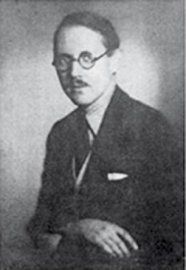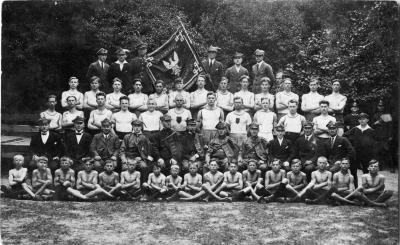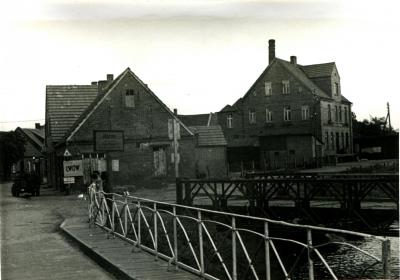Displaced Persons (DPs)

At first they were placed in transit camps. Some of them decided to emigrate and others to remain in Germany. From the very start Polish DPs organise their own structures. After 1951 the Union of Polish Refugees (Zjednoczenie Polskich Uchodźców) whose headquarters were in Velbert, was their principal representative body. The organisation worked under difficult conditions. Communist secret services tried to shadow them. In the 1950s they set up a huge number of activities. Their influence declined in later years due to further emigration and the fact that their members were less active politically.
The end of the Second World War fundamentally changed the situation of Polish citizens in Germany. Because of the shifting of Polish borders many of the former Polish minority in Germany, including those in the autochthon population of Upper Silesia and Masuria, suddenly found themselves in Polish territory once again. The Polish centres in Germany began to close down. There were also serious demographic and material losses. Estimates say that around 150,000 Polish citizens (former German citizens), lived in all the occupied zones of whom 50,000 were in the Soviet zone. The occupation forces treated the Polish national group like Germans, in that they called them “Germans with a Polish migration background”. This made it difficult to revive Polish organisations which had been founded by the so-called “old emigration”. This term was created in order to differentiate the group from members of the so-called “new emigration”. The new emigration primarily included former forced labourers, prisoners of war and soldiers in Polish armed forces in the West. The occupation forces gave them the status of displaced persons and accommodated them in special camps and settlements which no longer contained any German inhabitants (e.g. Wildflecken, Hohenfels, Emmerich and Haren). These camps were organised and headed by UNRRA. From 1st July 1947 they were taken over by the International Refugee Organisation (IRO). The aim was to create better conditions in order to care for refugees and provide them with food and clothing etc. Future repatriation should also be facilitated.
At the start all DPs were accommodated in camps. This situation changed in the subsequent years after some of the inhabitants began to find work, marry and live outside the camps. Towards the end of the 1940s between 25% (in the British occupied zone) and 30 % (the American zone) lived outside the camps. By contrast three quarters of the Polish DPs in the French zone lived in private housing. The commanders in the camps were selected by the Allied forces and were directly responsible to them. Most of these were former prisoner of war officers. Independent self administrative organisations helped the commanders in the camps. They also dealt with cultural life and the education of the DPs, as well as distributing aid from care organisations. In order to ensure that camp life proceeded in an orderly manner the commanders had their own police force whose duties were to support the occupying forces and the German police in investigating crimes committed by camp inhabitants.
The Polish authorities attempted to repatriate all their citizens who had been imprisoned or worked in Germany during the war. These plans were implemented most completely in the Soviet zone where repatriation was sometimes compulsory. Up until the end of 1946 all the DPs in the zone returned to Poland, and up until 1949 20,000 members of the “old emigration” also did so. In the Western zones repatriation was also supported but not enforced. Hence it only occurred very gradually. Because of the new Communist regime in Poland a considerable number of Polish citizens refused to return home. Most of them emigrated further west. The remainder settled in West Germany.



